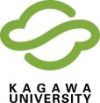Curriculum policy of the Faculty of Agriculture
The Faculty of Agriculture at Kagawa University has established a curriculum composed of university common subjects (32 credits or more) and faculty established subjects (92 credits or more) consisting of introductory subjects (8 credits), common basic subjects (19 credits or more), specialized subjects divided into 5 courses including laboratory and field experiments (50 credits or more), intermediate subjects for upper classes (3 credits or more) and “Research for Graduation Thesis” (12 credits) in order to foster human resources shown on the diploma policy. In order to enroll in the specific course from the second semester of the 2nd year, 20 credits or more of certain subjects are required by the first semester of the 2nd year. Similarly, in order to be assigned to a laboratory from the second semester of the 3rd year, 72 credits or more including compulsory subjects must be acquired by the first semester of the 3rd year. The number of required credits for graduation is at least 124 credits. The principles outlined in the diploma policy are realized through the educational methods described below.
1. Language and communication
*Students are to improve language skills in the communication subjects (university common subjects), and acquire professional English and presentation skills by “Science English (faculty established subject)” based on group work. Furthermore, to master the professional English concerning to agriculture, “Practical English” lectures and “Professional English” seminars offer training for advanced presentation skills. Communication skills by Japanese language are learned stepwise in the subjects which are shown below in 3.
2. Knowledge and understanding (as a citizen and bachelor (agriculture) in 21st century)
*In order to acquire a basic knowledge and wide field of view, students will enroll in university common subjects, and take faculty introductory and common subjects to cultivate agricultural point of view in their 1st and 2nd year. On that basis, in order to acquire applied scientific knowledge and skills necessary for solving agricultural problems, students will take specialized subjects, training and experiments divided into five specialized courses from the second semester of their 2nd year. By combining the acquisition of knowledge from lectures and concrete skills from training and experiments, students will achieve to master comprehensive and practical knowledge.
3. Ability to search and solve problems
*Students learn methods to search and solve problems in a “Startup Seminar on Academic Literacy (university common subject)”, deeply understand special fields by “Training in Applied Biology” in their 2nd year, learn faculty professional education including the training and experiment in an individual course for special knowledge and skills in the special field in their 2nd and 3rd year, and tackle “Research for Graduation Thesis” from the second semester in their 3rd year. “Research for Graduation Thesis” is conducted in small groups at the laboratory to extract problems in the fields related to the production and utilization of biological resources, to determine of solution method, to analyze samples and data sets, and to lead a certain conclusion through advanced PBL (Project Based Learning) type education.
4. Ethics and social responsibility
*After learning how to live as a 21st century type citizen on university common subjects and faculty specialized education, students will take intermediate subjects “Ethics of Applied Life Science” and “Bioenvironmental Conservation” to acquire ethics in agriculture and nurture awareness of social responsibility. These subjects are conducted in a lecture form that incorporates group work. Furthermore, in order to cultivate an international perspective, training lectures such as “International English Exercises” and “Domestic and Overseas Service Learning Programs” are offered. These subjects give a high ethical sense, awareness of social responsibility and an international perspective, which is foundational for investigation and problem solving in society.
5. Regional understanding
*In order to understand the relationship between regional industry and agriculture, the following subjects are established – university common subject concerning to regional understanding and a faculty specialized education such as “Introduction to Agricultural Sciences”, “Current Applied Biological Science” and subjects of regional resource science series (“Production and utilization of olive”, “Rare sugar science”, “Udon science”). These subjects are adopted according to the purpose of the lecture and incorporate various teaching methods such as lectures, practical training, group work, etc., and facilitate understanding of regional tasks practically. Furthermore, students will gain understanding of the regional society through practical activities by “Internship training”.
*Academic achievement is evaluated by the degree of comprehension of acquired knowledge in lecture subjects and also by the degree of application of knowledge and proficiency in professional skills for training and experiment subjects. With regards to “Research for Graduation Thesis”, the abilities for establishing a problem, and experimental analysis and practical solution for the problem are the key points for evaluation. These are decided with strict grading evaluation (on a five-level grading system and grade point averages [GPAs]).
